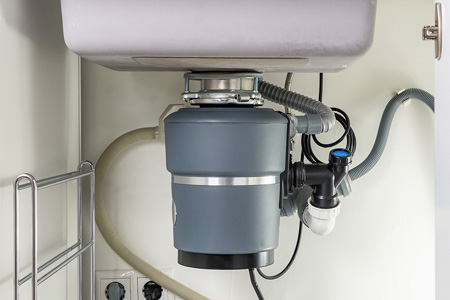Straightforward Ways to Repair a Leaky Waste Disposal Unit
Straightforward Ways to Repair a Leaky Waste Disposal Unit
Blog Article
What're your thoughts about Garbage Disposal Leaking From Bottom?

Waste disposal unit are crucial kitchen area home appliances that help in disposing of food waste successfully. Nevertheless, a dripping waste disposal unit can be an irritating and unpleasant problem to take care of. Luckily, numerous leakages can be dealt with easily with a few straightforward steps. In this write-up, we will go over exactly how to repair a leaking garbage disposal properly.
Intro
Garbage disposals are mounted under cooking area sinks and are made to shred food waste into smaller items, allowing it to pass through the plumbing system easily. While these gadgets are typically dependable, leakages can occur gradually because of damage, loose connections, or damages to the device.
Usual Sources Of Leakages in Rubbish Disposals
Worn Seals and Gaskets
Seals and gaskets play a crucial role in protecting against water from leaking out of the waste disposal unit. With time, these components can degrade, causing leakages around the disposal device.
Loose Connections
The links between the waste disposal unit and the plumbing system can end up being loosened in time, creating water to leakage out throughout operation.
Fractures or Openings in the Disposal Device
Physical damage to the garbage disposal, such as fractures or openings in the housing, can likewise lead to leaks.
Determining the Source of the Leak
Before attempting to take care of a dripping waste disposal unit, it is essential to determine the source of the leakage. This can commonly be done with aesthetic evaluation or by conducting basic examinations.
Visual Assessment
Examine the garbage disposal system meticulously for any indications of water leak. Pay close attention to locations around seals, gaskets, and connection points.
Testing for Leaks
One means to evaluate for leaks is by running water via the disposal unit and checking for any type of noticeable indicators of leak.
Devices and Materials Needed for Repairing a Leaking Garbage Disposal
Before starting the fixing procedure, collect the necessary tools and materials, consisting of a screwdriver, adjustable wrench, plumbing's putty, replacement seals or gaskets, and epoxy or patching product for fixing fractures or openings.
Step-by-Step Overview to Fixing a Dripping Garbage Disposal
Switch off the Power
Before trying any kind of repairs, guarantee that the power to the waste disposal unit system is switched off to stop the danger of electric shock.
Find the Leak
Identify the exact area of the leakage and establish the reason.
Tighten up Links
Utilize a wrench to tighten up any type of loose links between the disposal device and the plumbing system.
Change Seals or Gaskets
If the leak results from worn seals or gaskets, remove the old components and change them with new ones.
Patching Splits or Openings
For fractures or openings in the disposal device, use epoxy or an ideal patching material to seal the broken location.
Examining the Waste Disposal Unit After Fixing
When the repair is full, test the waste disposal unit by running water with it to guarantee that the leakage has actually been resolved.
Preventive Maintenance Tips to Avoid Future Leaks
To prevent future leaks, it is necessary to do routine maintenance on your garbage disposal. This includes keeping it tidy, staying clear of putting non-food items or hard things down the disposal, and occasionally checking for leaks or various other problems.
Final thought
In conclusion, fixing a dripping garbage disposal is a relatively uncomplicated process that can be finished with fundamental devices and materials. By adhering to the steps laid out in this short article and exercising preventive upkeep, you can keep your garbage disposal in good working problem and avoid expensive repairs in the future.
What to Do About a Leaking Garbage Disposal
A leaking garbage disposal often goes unnoticed until you confront a sopping cabinet, a foul-smelling puddle, or an audible drip-drip-drip from the unit. The fix can be frustrating, too, because the leak can stem from a number of components in the system. Fortunately, with a little sleuthing, you can zero in on the leak and—depending on the exact location—stop the icky oozing and repair the component that caused it. Worst case scenario, if it turns out that the garbage disposal must be replaced, installing a new one is a reasonable do-it-yourself task for those with basic plumbing skills. Read on to keep the cash you’d otherwise hand over to a pro.
Prepare to find the leak
Prior to testing the garbage disposal for leaks, unplug it at the wall outlet and turn off the power from the breaker box to prevent electrical shock. Then insert a watertight sink stopper into your sink drain and wipe the unit dry with a clean cloth. In any handy container, mix a few drops of food coloring into a few cups of water, and pour the dyed water onto the sink stopper to help you locate the leak.
Investigate the source
the top, where the disposal meets the sink drain the side, where the dishwasher hose or main drain pipe connects to the disposal or the bottom of the unit Inspect each of these locations while gliding a light-colored rag over the unit; the dyed water will readily show on the rag and reveal the location of the leak. If a leak isn’t immediately apparent, remove the sink stopper and pour a few more cups of dyed water down the sink drain, then check for leaks again. Leaks near the top of the unit are more likely to show themselves while the sink is plugged, while side and bottom leaks are more noticeable while the sink is unplugged.
The metal sink flange that sits directly inside the sink drain is typically sealed around the top with plumber’s putty (a clay-like sealant) and then secured from under the sink with bolts. If the plumber’s putty deteriorates, or the bolts loosen, the flange can no longer form a watertight seal between the sink drain and the disposal—which could cause a leak at the top of the unit.
To reseal the leaky flange, you must first detach the garbage disposal. Start by loosening the screws securing the main drain pipe to the disposal, then loosen the screws in the metal clamp securing the dishwasher hose to the disposal and detach the drain pipe and dishwasher hose from the disposal. Loosen the screws in the mounting ring that connects the disposal to the metal mounting assembly beneath the sink, then pull down the disposal and carefully set it on a clean, dry surface. Loosen the bolts in the mounting assembly with a wrench, then pull down the mounting assembly and set it near the disposal.

I found that post on Tips on Fixing a Leaking Garbage Disposal while surfing the internet. Be sure to set aside a second to share this blog post if you enjoyed reading it. I cherish reading our article about Why Is My Garbage Disposal Leaking From the Bottom?.
Request Service Report this page